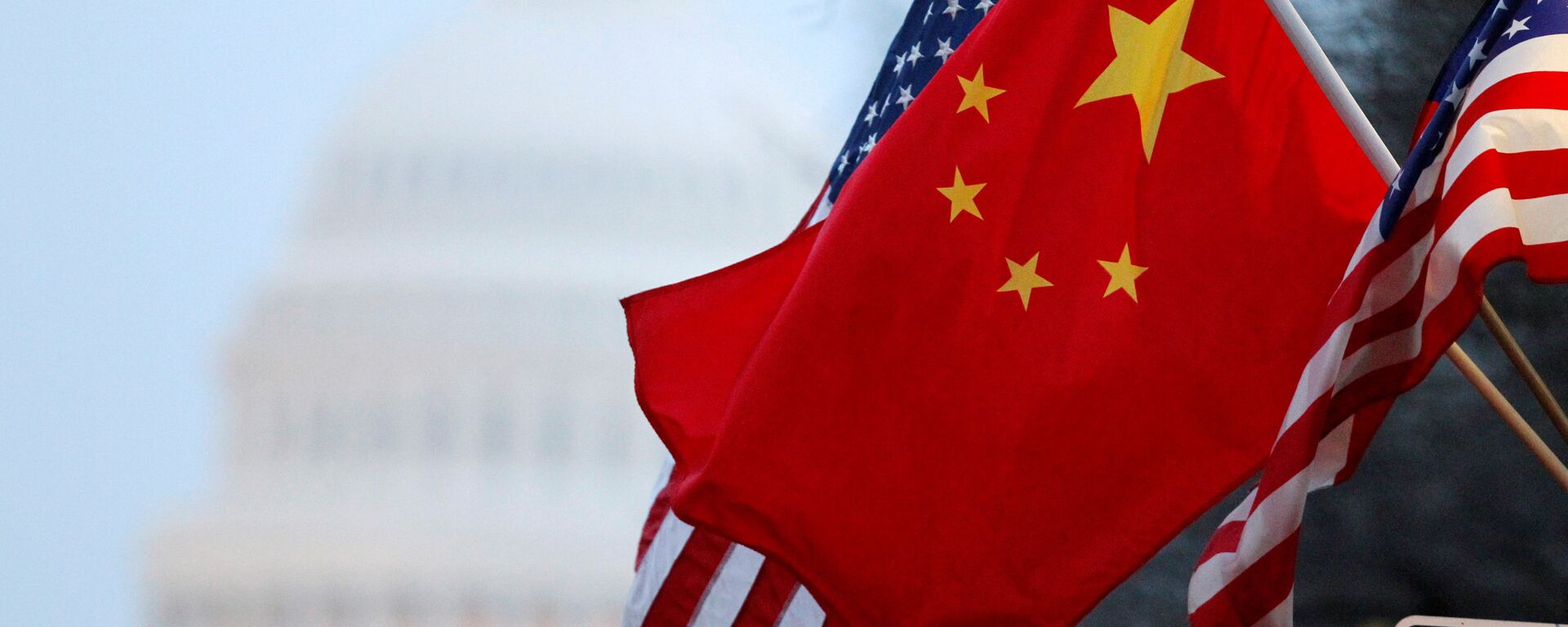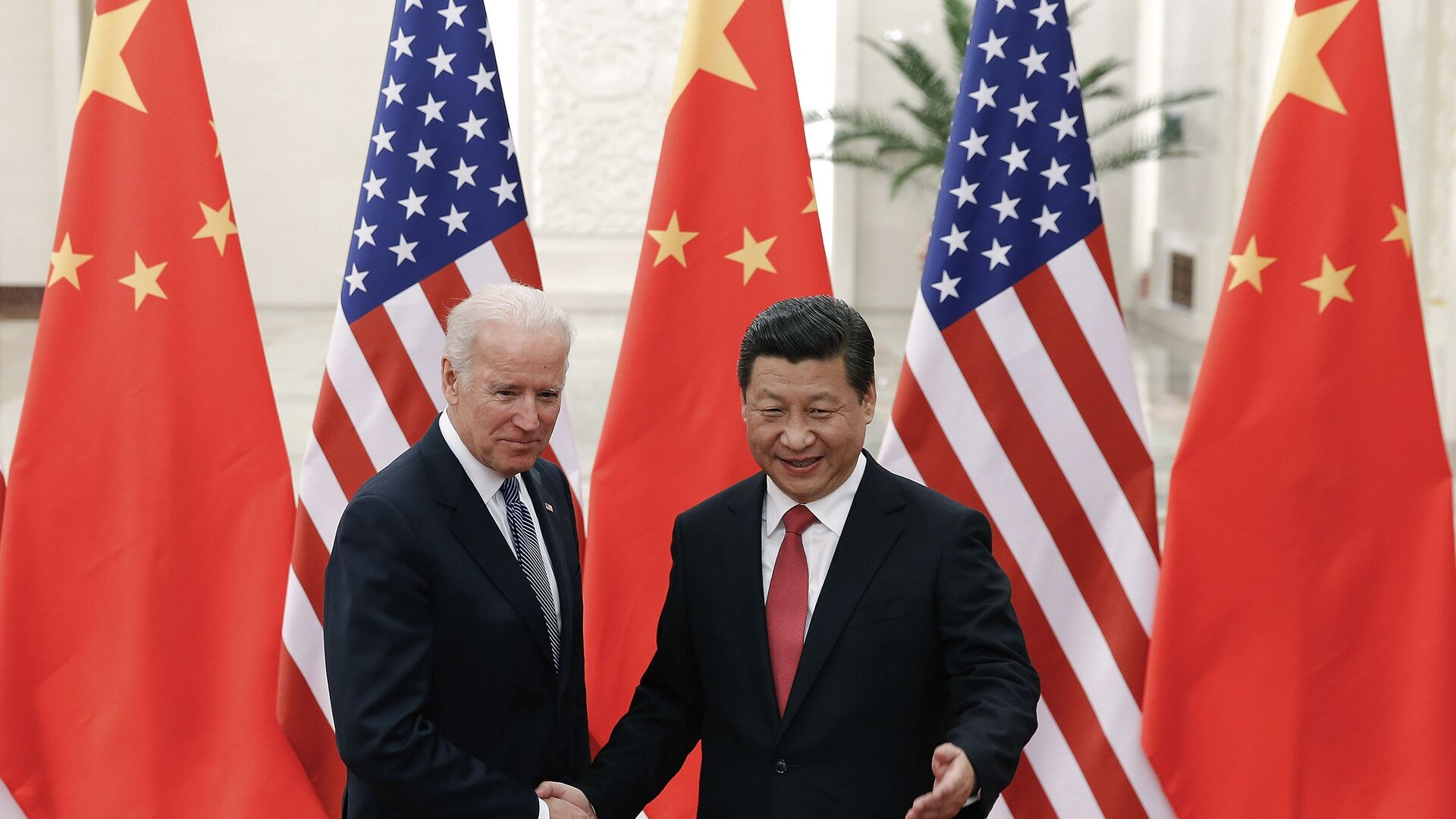https://sputnikglobe.com/20210910/confrontation-would-bring-disasters-beijing-warns-after-biden-xi-talk-bilateral-competition-1088949553.html
‘Confrontation Would Bring Disasters’, Beijing Warns After Biden, Xi Talk Bilateral Competition
‘Confrontation Would Bring Disasters’, Beijing Warns After Biden, Xi Talk Bilateral Competition
Sputnik International
In a speech before Congress in April, Joe Biden argued that US was “in a competition with China and other countries to win the 21st Century”, insisting that he... 10.09.2021, Sputnik International
2021-09-10T11:23+0000
2021-09-10T11:23+0000
2022-08-06T13:23+0000
joe biden
xi jinping
world
china
sanctions
relations
south china sea
phone talks
huawei
us
https://cdn1.img.sputnikglobe.com/img/07e5/02/07/1082008929_0:3:3001:1691_1920x0_80_0_0_96060e7a083d985b4fc2d72b8b7c4ffe.jpg
US President Joe Biden and his Chinese counterpart Xi Jinping held a phone conversation on Friday to discuss a spate of pressing issues of mutual interest, the White House has said in a statement.According to the White House, the discussion was part of the US’ current efforts “to responsibly manage the competition between the United States and the PRC [People’s Republic of China]”.“President Biden underscored the United States’ enduring interest in peace, stability, and prosperity in the Indo-Pacific and the world and the two leaders discussed the responsibility of both nations to ensure competition does not veer into conflict”, the statement noted.A Chinese government statement partly echoed the White House's remarks, stressing that “the world's destiny depends on whether China and the US can manage their relations well”.The state-run broadcaster China Central Television meanwhile cited President Xi Jinping as saying during the phone talks that “the US policy toward China conducted for some time has caused serious difficulties in the relations between Beijing and Washington, which is not in line with the basic interests of the peoples of the two countries and the interests of all nations of the world”.US, China at Loggerheads Over Pressing IssuesThe Chinese leader was apparently referred to the two sides still being at odds over an array of sensitive issues, including those related to Taiwan, the South China Sea and Huawei.In mid-August, Beijing, which sees Taiwan as an inseparable part of China, urged Washington to stop official contacts and end arms sales to Taipei and fully abide by the one-China policy in order to avoid further damaging relations between the two countries.While the US is not involved in the territorial dispute, it often conducts so-called freedom of navigation missions in the South China Sea, which are slammed by Beijing as provocations.In a separate development, Richard Yu, the CEO of Huawei’s consumer business group, pointed out earlier this year that the Chinese tech giant lost its smartphone market share to key rivals, including Apple and Samsung, under pressure from harsh US sanctions.In May 2019, the White House added Huawei to the so-called Entity List, which prohibited American companies from doing business with listed companies without prior approval from the US government. The White House claims the company is collaborating with the Chinese government to allow it to spy on those who use the tech company's equipment, allegations that have been rejected by both Beijing and Huawei.The US sanctions have created serious challenges to Huawei’s smartphone business, as the Chinese company not only lost access to Google’s popular mobile services, but also faced challenges in securing supplies of microprocessors to power its devices.
https://sputnikglobe.com/20210828/china-blasts-us-intel-report-on-covid-19-origins-says-its-not-scientifically-credible-1083736533.html
https://sputnikglobe.com/20210831/china-says-us-pullout-from-afghanistan-shows-military-interventions-are-doomed-to-fail-1083757295.html
china
south china sea
Sputnik International
feedback@sputniknews.com
+74956456601
MIA „Rosiya Segodnya“
2021
Oleg Burunov
https://cdn1.img.sputnikglobe.com/img/07e4/09/0b/1080424846_0:0:2048:2048_100x100_80_0_0_3d7b461f8a98586fa3fe739930816aea.jpg
Oleg Burunov
https://cdn1.img.sputnikglobe.com/img/07e4/09/0b/1080424846_0:0:2048:2048_100x100_80_0_0_3d7b461f8a98586fa3fe739930816aea.jpg
News
en_EN
Sputnik International
feedback@sputniknews.com
+74956456601
MIA „Rosiya Segodnya“
Sputnik International
feedback@sputniknews.com
+74956456601
MIA „Rosiya Segodnya“
Oleg Burunov
https://cdn1.img.sputnikglobe.com/img/07e4/09/0b/1080424846_0:0:2048:2048_100x100_80_0_0_3d7b461f8a98586fa3fe739930816aea.jpg
joe biden, xi jinping, china, sanctions, relations, south china sea, phone talks, huawei, us
joe biden, xi jinping, china, sanctions, relations, south china sea, phone talks, huawei, us
‘Confrontation Would Bring Disasters’, Beijing Warns After Biden, Xi Talk Bilateral Competition
11:23 GMT 10.09.2021 (Updated: 13:23 GMT 06.08.2022) In a speech before Congress in April, Joe Biden argued that US was “in a competition with China and other countries to win the 21st Century”, insisting that he is not interested in conflict with Beijing.
US President Joe Biden and his
Chinese counterpart Xi Jinping held a phone conversation on Friday to discuss a spate of pressing issues of mutual interest, the White House has said in a statement.
“The two leaders had a broad, strategic discussion in which they discussed areas where our interests converge, and areas where our interests, values, and perspectives diverge”, agreeing to cooperate on both sets of problems "openly and straightforwardly”, the statement underscored.
According to the White House, the discussion was part of the US’ current efforts “to responsibly manage the competition between the United States and the PRC [People’s Republic of China]”.

28 August 2021, 03:36 GMT
“President Biden underscored the United States’ enduring interest in peace, stability, and prosperity in the Indo-Pacific and the world and the two leaders discussed the responsibility of both nations to ensure competition does not veer into conflict”, the statement noted.
A Chinese government statement partly echoed the White House's remarks, stressing that “the world's destiny depends on whether China and the US can manage their relations well”.
“Bilateral cooperation would benefit the world; confrontation would bring disasters. The US-China relationship is not a multiple-answer question of whether we should have good relations, but a compulsory question of how”, the statement emphasised.
The state-run broadcaster China Central Television meanwhile cited President Xi Jinping as saying during the phone talks that “the US policy toward China conducted for some time has caused serious difficulties in the relations between Beijing and Washington, which is not in line with the basic interests of the peoples of the two countries and the interests of all nations of the world”.
US, China at Loggerheads Over Pressing Issues
The Chinese leader was apparently referred to the two sides still being at odds over an array of sensitive issues, including those related to Taiwan, the South China Sea and Huawei.
In mid-August, Beijing, which sees Taiwan as an inseparable part of China, urged Washington to stop official contacts and end arms sales to Taipei and fully abide by the one-China policy in order to avoid further damaging relations between the two countries.
Also in August, Dai Bing, Chinese deputy ambassador to the UN, described the US as “the biggest threat to peace and stability" in the South China Sea. Beijing lays claims to large swathes of the sea, with the Philippines, Vietnam, Malaysia and Brunei, as well as Taiwan having overlapping claims.
While the US is not involved in the territorial dispute, it often conducts so-called freedom of navigation missions in the South China Sea, which are slammed by Beijing as provocations.
In a separate development, Richard Yu, the CEO of Huawei’s consumer business group, pointed out earlier this year that
the Chinese tech giant lost its smartphone market share to key rivals, including Apple and Samsung, under pressure from harsh US sanctions.

31 August 2021, 07:29 GMT
In May 2019, the White House added Huawei to the so-called Entity List, which prohibited American companies from doing business with listed companies without prior approval from the US government. The White House claims the company is collaborating with the Chinese government to allow it to spy on those who use the tech company's equipment, allegations that have been rejected by both Beijing and Huawei.
The US sanctions have created serious challenges to Huawei’s smartphone business, as the Chinese company not only lost access to Google’s popular mobile services, but also faced challenges in securing supplies of microprocessors to power its devices.







